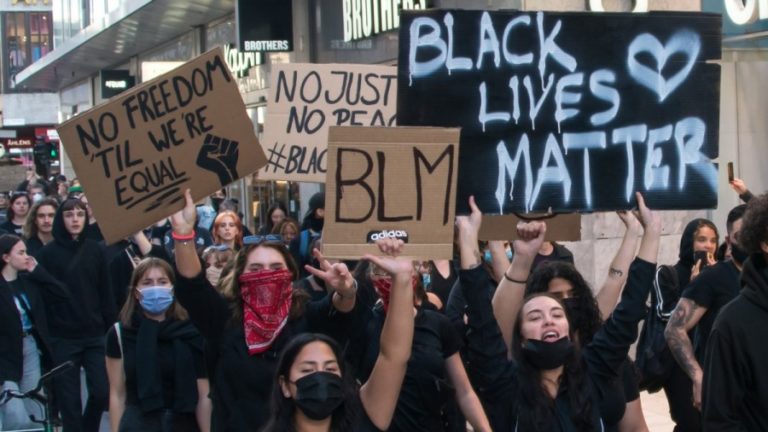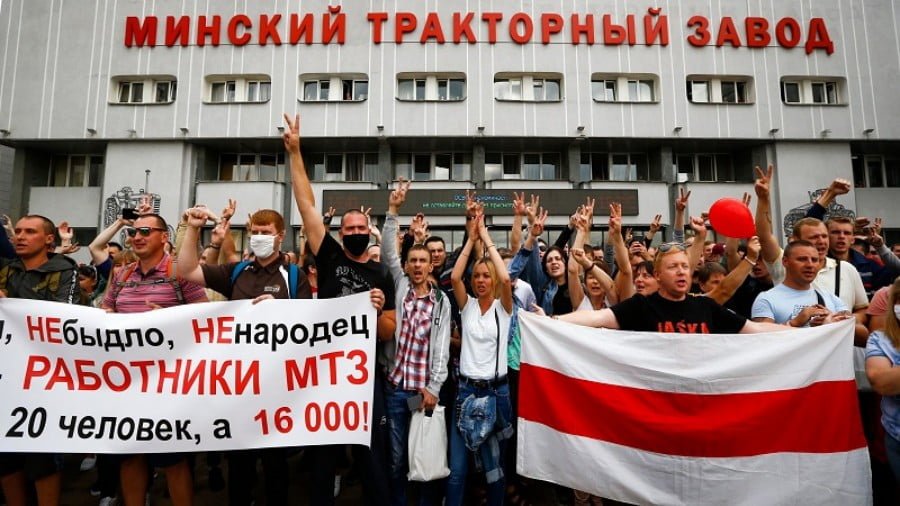World War C Looks Likely to Topple the Ivory Tower
Higher education’s sudden shift from in-classroom to virtual instruction as a result of the anti-COVID containment measures implemented throughout the course of World War C looks likely to eventually topple the Ivory Tower of elitist learning, leading to profound changes that could liberate the American masses from the unbearable burden of falling into massive debt in order to pay absurdly high tuition fees as well as drastically reduce the influence that politicized professors have over society.
***
From The Personal To The Virtual
The coming COVID World Order is fraught with dystopian outcomes, but there might actually be a silver lining of sorts if World War C eventually leads to the toppling of the Ivory Tower of elitist learning. Higher education has suddenly shifted from in-classroom to virtual instruction in order to maintain “social distancing” between students, with this successful transition profoundly changing society’s perceptions of this institution. Children and teenagers arguably require the social interaction that comes with in-classroom instruction, be it actively engaging with their teachers or simply making new friends among their classmates, but this is no longer as important as it once was after they mature into adults and decide to study the social sciences. So as to not be misunderstood by the reader or have the focus of this analysis misportrayed by self-interested critics, higher education in the physical sciences such as engineering absolutely necessitates in-person training by a qualified professional, but the situation is altogether different with the social ones like political science that comprise what’s popularly described as the Ivory Tower, which is what this piece is all about.
Defining The Ivory Tower
What’s meant by the Ivory Tower is the elitist power structure that disproportionately influences society through its indoctrination of aspiring professionals who by virtue of social inertia are mostly compelled to receive a university degree before being regarded as “eligible” to work in their chosen profession. The Ivory Tower is rightly stereotyped as being staffed by professors whose idealism ironically divorces them from the reality of actual life in most cases, which makes it all the more frustrating for some people to feign understanding — and in some cases, even false agreement depending on how “ideologically zealous” the professor in question is — of these ideas in order to pass the class and thus make progress on one day receiving their degree. Through this process, a statistically insignificant minority of individuals is able to brainwash millions of people each year, many of whom might never have developed the critical thinking skills required to form their own judgement and therefore prevent themselves from being indoctrinated over the years. Seeing as how the ideology that’s usually being pushed by professors in Western higher educational systems is the liberal-globalist one, this has naturally led to the gradual engineering of society after their acolytes entered into positions of power over everyone else and sought to change the masses’ generally conservative outlook on life.
The Cash Catalyst For Catastrophe
This charade has survived for so long for several reasons, the first of which is historical. Knowledge used to be the luxury of a privileged elite which did everything in their power to hide it from the masses, only passing it along to those who they desired to replace them in their ranks. That eventually changed with the advent of what’s now known as public and private universities, which in theory were supposed to “democratize” the higher education system by making it more accessible to the masses. To advance this noble goal, the US government provided loans to aspiring students, but this influx of easy cash into the educational ecosystem had the consequence (whether inadvertent or intentional) of triggering gargantuan tuition hikes by the profit-minded educational institutions which saw the opportunity to collude with one another in pursuit of their shared financial interests, which also took the form of charging ludicrous lodging rates for the dorms and requiring students to purchase outrageously overpriced textbooks each semester. The government didn’t seem to mind one bit since student loans can’t be defaulted on, which in turn transforms the recipient into a slave to their country’s economic-financial system until they finally free themselves from this burden after some years.
Indentured Indoctrination
The ideologues who either infiltrated into these educational institutions or were invited into them by their ideologically sympathetic superiors brilliantly exploited this state of affairs by forcing their views onto the student masses, who were forced to listen to them for hours each semester out of fear of having their long-term financial investment into receiving a social sciences degree be all for naught if they dropped out of their studies in protest or failed the class in question because they couldn’t successfully parrot their professors’ propaganda during “exams”. The reader should be reminded that the only reason why these students even go through this process is because of society’s expectation that they’re “unqualified” to work in their chosen professions in the social sciences sphere unless they’re “credentialed” to do so by what’s presumed to be “qualified” professionals, which are supposed to be their professors employed by their country’s seemingly “prestigious” educational institutions. This dual indoctrination-indebtedness operation was able to go on unimpeded for decades until the rise of the internet made it possible to learn almost everything about social sciences (except specific knowledge acquired from field work in very rare cases) outside the classroom and World War C made it necessary to do so for public health reasons.
Debunking Pervasive Social Myths
The problem, however, is that students still need to obtain a degree from a higher education institute in order to “confirm” that they actually “learned” what they said they did due to society’s continued presumption that only “qualified” professionals can bestow this accreditation onto them and thus make them “eligible” for employment in their desired profession, meaning that one can’t simply rely solely on online resources extensively studied on their own at home. Nevertheless, that’s essentially what studying the social sciences already entails in the higher education system since students pretty much only read materials at home (be they textbooks — many of which can be “creatively” obtained online for free — or online resources), receive a summary of the aforesaid from their “qualified” professors, and possibly discuss them with the latter and/or their peers during in-classroom “instruction” (which is a misnomer since it’s more akin to in-classroom review than actually learning something new not already contained within the materials that they were supposed to read before attending the “lesson”). Instead of doing the second and third steps (listening to summaries from “qualified” professors and then discussing them) in class, students are now using software such as Zoom to do this from the comfort of their own homes.
Cutting Out The Middle Man
The very fact that higher education in the social sciences is being carried out remotely removes the need for students to pay for expensive dormitories the longer that this carries on for, and they might even no longer need to purchase expensive textbooks since their professors would share materials with them digitally if they’re unable to go to the book store and buy these supposedly “required” texts (which can “creatively” be obtained online anyhow in most cases). The only purpose of paying tuition is just to sit in on a video conference with a “qualified” professor as they summarize recent readings and interpret them for students during a discussion, which immediately raises serious questions about the cost of this service. In theory, the materials (syllabus and texts) provided by the professors to their students could be copied and anonymously shared online with others through prospective crowdsourced educational platforms, which could even include surreptitious recordings of their video conferences (“virtual instruction”). The latter can also confirm that these “qualified” professors are indoctrinating their “captive audience” (students) whenever that occurs, which could in turn be shared with activist media outlets agitating for educational reform, thus further exposing the whole agenda-driven system.
The Entrepreneurial Solution
Against this backdrop, all that it takes is for an enterprising university (either already accredited by the authorities or which builds up a credible enough reputation with their target audience of employers with time) to remove the excess expenses from the higher education process by optimizing their operations through solely online instruction which would include reading materials, video conferences (including prerecorded ones), and final assessments of students made by legitimately qualified professionals (as in those that aren’t interested in ideologically indoctrinating their “captive audience” and only care about pragmatically teaching them what they need to know in their future fields of work). If properly executed, the entire process of educating students in the social sciences sphere could be shortened to 1-2 years at the most if so-called “electives” are dropped from the requirements for their online degree and students are only taught and tested about what they need to know for practical entry-level work, learning everything else on the job through personal experience as is most often the case in this field anyhow.
The Roots Of Revolution
The Ivory Tower will predictably push back against this seemingly inevitable development (no matter how long it takes to enter into fruition by enterprising institutions) by attempting to discredit it for supposedly producing “unqualified” graduates who have only received a “low-quality” education, “if even one at all” since it wasn’t supervised by “qualified” professionals, because they want to cling to power no matter what despite how outdated and unrealistic their almost purely “academic” and agenda-driven indoctrination goals are. What’s being proposed by the author is nothing short of a revolution in the higher education system that can only succeed by enterprising institutions taking the lead in toppling the Ivory Tower (be it for financial and/or, ironically enough, ideological reasons) and prospective employers being pragmatic enough to understand, facilitated as it all is by the unprecedented opportunity afforded by World War C after this entire process was just proven beyond a doubt to be able to be carried out remotely without any of the expenses associated with in-classroom “instruction” (indoctrination).
Responding To The Counter-Revolution
Although admittedly ambitious, the author strongly believes that this vision of the future is realistic and would be to the benefit of students and society alike, though it will definitely take time to implement. The “academic deep state” (influential alumni, permanent bureaucrats whose jobs are subsidized by excessively high tuition rates, powerful donors, and ideological professors in the Ivory Tower) will assuredly attempt to team up with their counterparts in the more “traditional” “deep state” that have a shared interest in profiting from the millions of students who submit to unbearable debt bondage each year due to the currently corrupt system so that they can jointly reverse this revolution, but their efforts could be countered if students organize themselves and make their voices heard on the national level agitating for this revolution in education affairs. That would naturally pique the attention of other less greedy but nevertheless still financially driven actors who might be enterprising enough to execute the author’s elaborated vision, which could lay the groundwork for tangible change in this sphere once responsible employers realize that they can recruit new employees at a quicker rate than before and who might arguably be more qualified in practical terms than their “legacy” counterparts.
A Pragmatic Reframing Of The Debate
It doesn’t matter whether the degrees that these students would receive after their virtual education are officially recognized by the state or not (which they likely won’t be, at least not right away, due to the the confluence of interests between the academic “deep state” and the financial components of their “traditional” counterpart) since all that’s important in practical terms is whether prospective employers accept this document as proof that aspiring workers are qualified for entry-level positions in their profession of choice. That’s not too difficult to do either considering that their core education comprises only half of the average four-year higher education timefame, which can be compressed to one year if the process itself is properly optimized. Society would be all the better off because of it too not just because it would no longer be receiving as many indoctrinated individuals into the social sciences workforce as before (and subsequently into possible positions of influence over everyone else), but because these new members of the workforce would be less beholden to debt bondage if the cost of a virtual education remains realistically affordable unlike its in-classroom variant, therefore freeing them to more actively contribute to the economy instead of spending years paying off their student debt by transferring tens of thousands of dollars into the state’s coffers instead.
Possible Pitfalls
What the author proposed isn’t free of possible pitfalls that could doom this higher education revolution in its infancy, which is why it’s imperative that prospective student activists and entrepreneurial institutions in support of this cause be aware of the most likely challenges ahead. Other than the difficulty in getting society to critically rethink exactly what constitutes a higher education nowadays, the other obvious obstacle is that emerging virtual education institutions might be bought out by their “legacy” competitors before they ever have a chance to make a noticeable difference. The “academic deep state” might also voluntarily reduce tuition after some time in the face of any credible competition that they can’t control but attempt to replace their lost profits by charging students more for lodging, textbooks, and on-campus meals for example, thus creating the deception that they’re reducing costs through highly publicized tuition reductions but in actuality not really changing much about their core business interests. Another scenario could see these “legacy” institutions co-opt their virtual counterparts and simply use them as a vehicle for carrying out the indoctrination of the masses unimpeded, thus neutralizing the ideological goal of liberating students’ minds even if the financial one of lower costs and subsequently less student loans is somewhat (even if only superficially) met.
On that topic, it should be said that virtual indoctrination might be less effective than its in-person variant, but it’s still indoctrination nonetheless even if its impact might be mitigated on the masses. Whether co-opted by “legacy” institutions or insidiously ideological from the get-go, those virtual institutes which replicate the indoctrination issues of their counterparts might not become the majority in this emerging industry, therefore leaving students more of a choice about which one to enroll in according to their needs and preferences. With time, some brands will become much more reputable than others, though the risk is that their reputations might be abused to simply create another Ivory Tower, which would in effect amount to the “academic deep state” adapting itself to the new market conditions that it was forced to respond to in that case. There’s no way to safeguard against this scenario, but it’s predicted that the proliferation of virtual higher education institutes might manage that threat a lot better than the existing one which has been almost impossible to counter for decades already due to the monopoly that “legacy” institutes had on the higher education process, both in terms of their physical control over it but also the influence that they wield over society’s relevant perceptions.
Concluding Thoughts
The author is under no illusions that what he’s proposing is nothing short of revolutionary, difficult to implement, and will take time to properly execute, but he’s convinced that it’s not only doable, but also inevitable given just how profoundly the consequences of the coming COVID World Order will be on the higher education system. There will always remain a social need for in-person instruction up to the university level, but afterwards students don’t have to remain in their classrooms in order to be educated in the social sciences if they choose a career along that path.
The Ivory Tower, which most infamously symbolizes the “academic deep state”, will stop at nothing to smash its emerging virtual education rivals, working hand-in-hand with profit-minded elements of their “traditional” “deep state” counterpart to safeguard their ideological and financial interests, but that threat is by no means a guarantee of their success in stopping what is arguably the beginning of a self-sustaining and seemingly inevitable reform in this sphere.
Liberating students from the bondage of debt through more cost-affordable education alternatives and protecting their minds from liberal-globalist indoctrination by so-called “qualified” professionals is to the ultimate benefit of society, though it necessitates a transformation in terms of how society and the prospective employers within it conceive of the higher education process as a whole, thus meaning that public awareness campaigns and high-profile politicization of this cause are a must in order to correct (“re-engineer”) their perceptions so as to implement this ambitious plan as soon as possible.
By Andrew Korybko
Source: One World







